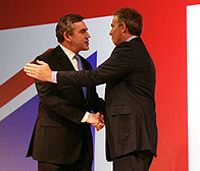Blair to resign paving the way for Brown
Blair's decade in power ends Wednesday after facing questions in Parliament and having a last lunch at No. 10 Downing St. before Gordon Brown takes command of government.

For Brown, who for 10 years has controlled the national finances as chancellor of the exchequer, it is the culmination of a long - and reportedly frustrating - quest for the top job.
See photos of how Tony Blair spends his last days on Downing Street
Brown's devotion to fiscal "prudence" and his commitment to increasing aid to Africa are well known, but questions remain to be answered about what he intends to do in Iraq and more generally about his foreign policy goals.
British troop numbers in Iraq have rapidly fallen through 2007 and soldiers are now stationed on the fringes of the southern city of Basra.
Blair has left his successor an option to call back more of the remaining 5,500 personnel by 2008 - an opportunity likely to be grasped by a leader with a national election to call before June 2010.
“His hands, whilst not quite clean, are certainly not sullied,” said Alasdair Murray the director of CentreForum, a liberal think-tank. Brown can ``portray it as Blair's war and differentiate himself.”
Brown may sanction a future inquiry on Iraq, similar to the U.S. Study Group, British media have reported. Britain has to ``admit where we make mistakes,'' Brown told a recent rally, referring to the war.
In Europe, bridges have been built with German Chancellor Angela Merkel and new French President Nicholas Sarkozy, but tensions are likely to emerge, the AP reports.
For British politics, Blair's willing departure from office is a rarity. With no term limits, all except three of the 18 prime ministers in the 20th century went on until they lost an election, were forced out by their own party, or died.
Blair attempted to avoid any of those fates when, in September 2004, he said he would serve one more full term and then retire. If he did not succeed in that ambition -- he is retiring only halfway through his third term, after support within his party ebbed away -- he did at least avoid the end suffered by Margaret Thatcher, who was told by her own Cabinet that it was time to go in 1990.
In electing Brown unopposed, Labour may have managed the ``smooth and orderly transition of power'' that both Blair and his chancellor said they wanted to achieve. This avoided a damaging public battle within the ruling party.
Brown now must sidestep the precedents of history. Since World War II, five men have taken over as prime minister in mid- term, and only one of them offers Brown an inspiring example.
Two, Alec Douglas-Home and James Callaghan, went on to lose the next election. Anthony Eden, who took over from Winston Churchill in 1955, called and won an immediate election, then resigned two years later after the failed attempt to recapture the Suez Canal from Egypt. John Major, who followed Thatcher, held off calling an election as long as possible until 1992. Then he won it with a much-reduced majority in Parliament, leading to five years of bitter infighting within the Conservative Party before a landslide defeat in 1997.
Brown's best role model may be Harold Macmillan, who succeeded Eden in 1957. He also came in from the finance minister's job and served 6 1/2 years, winning an increased majority in an election and earning the nickname ``Supermac.'' He retired for health reasons and was succeeded by Douglas-Home, Bloomberg reports.
Source: agencies
Prepared by Alexander Timoshik
Pravda.ru
Subscribe to Pravda.Ru Telegram channel, Facebook, RSS!


